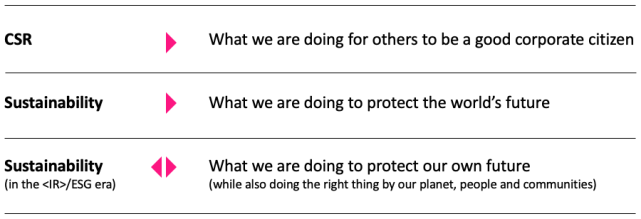An important component of Sustainability is too often completely ignored. Particularly right now.
Sustainability Reports (and their precursor CSR Reports) tend to focus on how a company’s actions impact on others – be that the environment, their staff or their communities. Often it’s about doing the right thing and being seen to do the right thing – and there’s nothing wrong with that. Most of our clients are completely authentic in this regard and can’t be faulted.
But in many ways this single-minded approach can treat those topics as if they are separate from the business of generating revenue and earning profits. I firmly believe that those days are over. Recent dramatic events have really brought the flip side of all this into stark relief. Now more than ever the two sides are inextricably linked. Those things can materially affect our own future viability as much as they affect our stakeholders - unless we limit their impact on us by thinking ahead and looking after them.
__
Sustainability is as much about how People and Place could affect your Performance, as about how your activities are affecting People and Place.
__
Let’s really over-simplify this for the sake of clearly understanding the evolution:

Most Sustainability teams’ mindsets are still of a one-way flow, whereas they should have plurality in mind and strategise a really important two-way flow - a perspective that actually brings us closer to today’s reality. And that’s a complete mental flip for many people - the return flow part that protects the future viability of the business is often not factored into thinking or reporting.
Of course, this has been the underlying purpose of Integrated Reporting and Integrated Thinking since the inception of the Framework. But let’s be honest, most companies conveniently overlook that aspect, and focus mostly on the corporate responsibility aspects – the one-way journey.
Interestingly, the more recent ESG evolution adds this reciprocal journey to Sustainability thinking. ESG is all about the self-awareness of what the environment, people and social licence to operate could do to your business model if not monitored, managed and measured. But that's usually considered semantics unless somebody digs below the jargon label (read What’s in a name: Sustainability vs ESG?)
Enough of the theory – how does it look in practice?
Consider how your identified highly material issues, your operating environment or your social licence to operate could change. And how the way you treat people, internally and externally, and how your Board governs, could come back to bite your business model at some future point. In fact, given the rapid advance of things like climate change, some of these things could already be impacting your financial outlook or brand reputation. This is no longer hypothetical stuff. For example:
- How government regulation changes to prevent further environmental or social deterioration (such as fossil fuel limitation moves, forestry rule changes or transport strategies) could change your cost base.
- How risks to supply chains, such as from protectionist trade policies or New Zealand’s small scale and distance from major markets may position you at the bottom of a global supplier or customer’s pecking order.
- How things like employee engagement scores can affect retention and recruitment in a constrained labour market.
Whereas pre-Covid many of these factors may have registered as long term risks, suddenly, thanks to pandemics, weather bombs and European wars, they have become very real and present ones.
Embrace the infinity loop
So the next big leap in Sustainability and ESG reporting is about closing the loop. As much about how People and Place could affect your Performance, as about how your activities are affecting People and Place.
Now’s the time to get your head around the infinite loop of this stuff and really embrace the reciprocal nature of it. There’s a rebound effect on viability and success. And that may require a complete recalibration inside your sustainability team in many organisations.
Company performance is becoming more and more inextricably linked to its environmental and social contexts. And this will only come into sharper and sharper focus. It’s time to get ahead of that curve - and think and report on both halves.
Then, and only then, does Sustainability become Business Sustainability.

